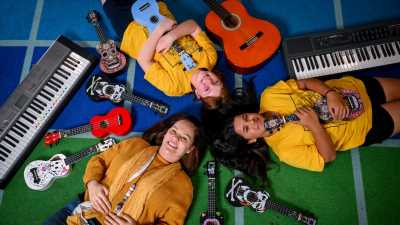It’s in the curriculum, but most teachers don’t expect to ever teach this subject
Save articles for later
Add articles to your saved list and come back to them any time.
It’s a subject that’s part of the curriculum, yet only one in five pre-service teachers observe a class before giving one themselves.
Australian universities have cut music education training for primary teachers in half over the past 13 years, leaving thousands of teachers feeling unprepared to meet their curriculum responsibilities, according to a new study by teaching experts.
Berwick Lodge Primary School music teacher Lorraine Montgomery with students Genny (long dark hair) and Grace at their music room.Credit: Photo: Eddie Jim
Average music education training at university fell from 17 hours in 2009 to eight by the end of 2022, the research, by music education organisations Alberts and The Tony Foundation and music learning expert Dr Anita Collins, shows.
Fading Notes: The State of Music Education for the Next Generation of Primary Teachers is based on surveys and interviews with 36 music lecturers, representing 73 per cent of those delivering primary teaching degrees across Australia, and analysis of public information from 49 universities.
Teaching students in Victoria receive the least music training in the country – only about six hours over the course of an initial teaching degree, which usually takes four years to complete. Tasmanian and Western Australian students receive the most hours of music education training – 12 hours – during their teaching degree.
Half the surveyed lecturers said their students need more development to teach music effectively and said 71 per cent of their students didn’t expect to teach music in the classroom. One reported their students couldn’t even adequately clap a beat or a simple rhythm, and others said they didn’t have time to learn how to use pitch, analyse music, use technology or improvise and compose.
Collins said there was plenty of research that showed students who learned music – particularly as a supportive or complimentary activity when they go through language learning, reading, and writing – do much better than those who haven’t.
“We’re hoping this report will bring to light that we’re not giving our teachers as much [skills] as they might need to teach successfully and have that great feeling of what it is to really impact on their students,” she said.
“It actually is beneficial for every child, and has the potential to impact on so many other learning areas that we are looking at as being a problem, like literacy and numeracy.”
Each state and territory approached the arts differently, Collins said. In Victoria, for example, some primary schools may do a different arts subject each term, but music education was quite varied and fluid.
“That’s not from the curriculum – that’s actually how the curriculum is interpreted. It’s just very patchy, and it is done differently in different schools and different systems,” she said.
Collins, who was involved in the 2018 ABC documentary series about music education in schools, Don’t Stop the Music, said she was concerned for students who were struggling with language development at lower socio-economic schools.
“These kids’ [in the TV series] life trajectory was changed by the fact that they had the opportunity to have music education in their school in a way that effectively improved … their real baseline skills,” she said.
She said music could supercharge a child’s skills to read or write, as well as boost their ability to self-regulate emotions and stay on task.
“My greater concern is what are those students … going to actually miss out on? And then how’s that going to impact on our society?”
Only 3.82 per cent of the 4670 graduate teachers at surveyed universities entering primary school each year have a specialisation in music learning and two-thirds of identified universities didn’t offer a music specialisation, according to the report.
Emily Albert, executive director of Alberts, The Tony Foundation’s Music Education: Right from the Start initiative, said quality music learning for primary school students was at risk of disappearing. She said state and federal governments need to intervene to stop the decline of music education.
The report calls for a range of improvements, including ensuring primary teaching students observe and participate in music lessons and raise awareness of the lack of fair access that children have to quality music teaching in schools.
Lorraine Montgomery, who teaches performing arts and music at Berwick Lodge Primary School, said teaching music after only six hours of training would be difficult.
“You have to be driven to do your own research,” she said.
Montgomery said she did a state government professional development course called Musical Futures in 2017, which trained non-specialist music teachers to give them skills to confidently teach.
“If you don’t have that passion – even having the confidence to sing in front of the children … it’s certainly trickier. A lot of schools aren’t even offering performing arts.”
A Department of Education spokesperson said all students deserve the opportunity to participate in classroom music at school with well-qualified teachers.
The Victorian government invested $3.5 million to continue the Music in Schools program, giving primary teachers a chance to build confidence in music education. There are also grants of up to $4000 for music resources.
“This program has delivered professional training and support to around 1200 schools and 2000 teachers since 2015.”
Our Breaking News Alert will notify you of significant breaking news when it happens. Get it here.
Most Viewed in National
From our partners
Source: Read Full Article


